K.E. Garvey's Blog, page 7
September 14, 2015
Jack Kearney
Today I had the pleasure of talking with a man who is an ‘actor turned writer’. Help me to welcome Jack Kearney, author of Inside Out.
IDI – As a writer, what is the one thing you would most like people to know about you?
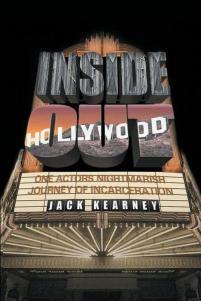
Inside Out
JK – First of all, I want to thank you for this opportunity. As far as writers go, I don’t really consider myself a real writer in the terms that most people would. I have written several TV and movie treatments, a few short stories, a couple of published poems, and the script that was the inspiration for my novel. So, I’ll leave it up to the readers as to determine whether or not I’m a writer. I think of myself more as someone who gets inspired now and then and has to put it down on paper.
IDI – You’re welcome. I’m happy to do it.
When did you know that you were born to be a writer?
JK – In high school I had to write a book report on The Iliad and Odyssey by Homer.” Instead of the normal format, I created a new character that was one of Odysseus’s men and reported it from his eyes. It was so well received that I knew I had some kind of talent. I think I was born to entertain. I spent most of my life as an actor, so I guess one could say I’m a born storyteller.
IDI – What works for you? Give us a rundown of your writing process from beginning to finished product.
JK – I write when inspired. I first think about the story line and after mulling it over for a few days, a month or more, I just write. I never rewrite unless you count the editing process. I am a bit dyslexic so if it weren’t for computers and spell check, I might not have even attempted any of it.
In the case of Inside Out, it was a close call just missing getting a DUI a few years after teaching some inmates an acting workshop at Lompoc Federal prison that was my inspiration. The scare made me wonder what would happen to an actor after a workshop like I had, but by a twist of fate he were to end up back inside with the inmates he’d been teaching. This is a plot that had never been done, not then and not now. The title, like everything else, wrote itself. Incidentally, I am very proud of my cover, which I designed as well.
IDI – We all draw from within and I believe there is an element of ‘us’ in everything we write. How much of you will a reader find in any given book?
JK – With this book, you can already guess that Danny Belson is a young me had my acting career been more successful. Inside Out was originally a script I had written in the mid-eighties after having taught the inmates in the late seventies. It was to be my Rocky.

Jack Kearney
IDI – Can you tell us three interesting things about you that you’re sure we don’t already know?
JK – I worked as an actor, but I was never a working actor. In my younger years, I was also quite a dancer. In the book, Danny plays pool one-handed, which is something I can also do. I have also won numerous Karaoke contest with my Elvis impersonation.
IDI – Had I known about your Elvis impersonations beforehand, I would have asked for a video to include!
Define a great book.
JK – A book that you can’t put down or can’t wait to get back to. I read my favorite book The Godfather in one sitting. Did you know that it was originally written as a script?
IDI – Who are some of the more influential writers that have inspired you?
JK – I am a bit old school when it comes to writers. As an actor, I have read my share of plays so Shakespeare, Tennessee Williams, and Arthur Miller are my favorites. As for book authors, I loved Philip Roth, Kurt Vonnegut and Stephen King. I loved Carrie and was hooked ever since. As an actor I also get much inspiration from a good TV show or movie. I am one of those that can guess the plot of most things, so I wanted to make sure Inside Out kept you guessing the whole time.
IDI – How much time/effort do you give to social media as a means of self-promotion?
JK – It’s a good thing I work out of my home because book promotion is fast becoming a full-time job.
IDI – What do you do when you’re not writing?
JK – I am semiretired and work part-time setting appointments for a couple of publishers of a private monthly newsletter. I have to confess that my reading habits have dwindled as I’ve gotten older. I have gone from reading a book a week to maybe one every few months. I do love to watch a well-written TV show or movie and of course, most sports.
IDI – What advice would you give to new/unpublished writers?
JK – Don’t ever give up! If you feel you have something worth while to say, say it. But be realistic when it comes to appealing to readers. If they don’t see your vision, it might be time to try something new. I have a saying that I live by that has been tweeted and re-tweeted so some of you may have seen it: “Dreamers rarely rule the world, but they can change it.”
IDI – Great words to close with. Thank you for appearing with me today, Jack. It’s been a pleasure.
Join Me!
Website – Facebook – Fan Page – Twitter – LinkedIn – Instagram – Goodreads – Amazon – Wattpad
Books!
Lily White Lies – The Red Strokes – Missouri in a Suitcase


September 8, 2015
Lianne Miller
IDI – Although Artifice is your debut, your second novel Vendetta is coming out very soon and you’ve started the third book of the series, Chaos. How long does it generally take you to write a book, from the spark of an idea to the finished product?

Artifice
LM – That can vary depending on the book and the time I have available to write. When I wrote The Legatees’ Journey, it took 15-years to finish the story (I was raising children and establishing a business).
The Nights of Shadow series is moving a lot faster: I began writing Artifice in August 2014 and it published in late May, early June of 2015. While my editor worked on Artifice, I began writing Vendetta (pending release date of November 15, 2015). With Chaos, the writing began before my editor received Vendetta (on track for release in the spring of 2016).
IDI – There are many ‘systems’ to write a novel: storyboarding, the 7-point structure system, the snowflake system, to name a few. Have you tried any of them? If so, share your thoughts and experiences.
LM – I’m a true pantser—an author who writes by the seat of her britches. An idea comes to me, the characters begin to grow (talk to me), and I sit down and let the words flow. Sometimes the beginning point may change—what I wrote as a first chapter ends up in the middle of the book—but other times it remains, and I always have a sense for how the book will end before I get there. In Artifice, the ending actually came to me in the middle of the story, and I wrote the final chapter long before the middle chapters of the book was finished. It was fun building the bridges between the middle and the end. Vendetta’s ending waited until I was nearer to the end of the story—there were two possible directions for me to leave the setup for the third book. The ending for Chaos is decided, and I’m excited to keep writing everything in between until I reach that final scene.
IDI – When you find yourself in a rut, where do you turn for inspiration?
LM – When my writing feels stagnate I turn to dreams, music, life, and may go on a hardcore reading binge. After devouring several books, as I reach a point that no new titles are jumping out at me, then I have to write the story I’m not finding elsewhere.
IDI – There are magazines and blogs full of what’s new and what’s hot in the publishing industry. Do you keep up with the latest news, advice, trends and such? What are your thoughts?
LM – While trends are important to marketing, if a story is good enough then it will stand on its own regardless if popular culture and society’s attention is pulled elsewhere. There’s a tendency to have information overload to the point where news, advice, and opinion conflicts to such a degree that it leaves one wondering what is the truth, and what should one believe. Always weigh the information with a grain of salt, an ounce of wisdom, and make the best-informed choice you can—that is the only way to deal with the huge volume of information about the publishing industry.
IDI – To date, what is the most negative comment you’ve read or heard about your current release?
LM – That the story is written in present tense and not in the past tense. Some readers do not like present tense stories, but I believe that some stories are better told with the immediacy and urgency that only present tense can bring to the storyline and characters. Artifice – Nights of Shadow would not be as powerful a story if it written in the past tense.
IDI – I heard the same thing said about my second novel, Lily White Lies. I think sometimes a reader is getting the story without necessarily seeing the vision.
Keeping with what readers think, this is what some have said to be a controversial question. What are your thoughts on Amazon and the reviewing process they use? How much trust do you put into the reviews posted for any given book?
LM – My debut novel, Artifice – Nights of Shadow (Book One), released about the same time that Amazon implemented the change in their review policy. I have nothing to judge it against, and I have not been notified by Amazon or any reader that a review has been blocked or removed. I do share other authors’ concerns that Amazon’s new policy may not allow for the author’s use of social media to reach his/her audience. If interaction with a fan can bar them from submitting a fair and honest review, then Amazon’s policy needs to address this issue in a manner that is fair to both the reader and the author.

Lianne Miller
IDI – You make a strong point and one many writers would agree with. I can’t say I understand the algorithms Amazon uses, but fans connect and interact with their favorite authors all of the time. If that interaction is enough to cause Amazon to remove a review, it’s not only unfair to the writers, but to potential readers looking to choose their next read.
Okay, I sidetracked for a moment. Next question, we all like to receive positive reviews. What is your reaction to a negative review? Be honest.
LM – The closest I’ve had to a negative review, so far, is a reader who gave Artifice a 2 star rating. The reader didn’t leave a comment and it left me curious as to why the reader rated the book that low. When I looked at the reader’s profile, the answer became clear: this reader consistently rates YA novels at 3-5 stars, and all other genres receive 1-2 stars. Artifice is a New Adult Contemporary Fantasy, not a Young Adult novel.
I am realistic and I know at some point that a reader may give a poor review of my story. If the review is fair with honest reasons given, then I will use the negative feedback to further improve my writing, and do a better job in presenting a published story.
IDI – Who’s your target audience? What aspect of your writing do you feel targets that audience?
LM – Artifice was created to lure all adult readers in, and the readers I wanted the most were those who don’t typically read fantasy stories—I wanted to turn them onto this genre. In that regard, Artifice did just that: “You’re going to turn me into a fan of the genre in spite of myself.” Maryanne C. (This reader is an older, retired woman who has avoided this type of fantasy story her whole reading life.)
IDI – Even though I won’t be posting my review until next week, I can say now that like Maryanne C., I have veered from fantasy and supernatural reads also. I ‘thought’ it was something I wasn’t into. And who knows, that may be the case should I pick up another book in that genre, but I was pleasantly surprised after reading Artifice. Regardless of how good the writing was, I was prepared to dislike the actual story. I imagined garlic necklaces, silver crucifixes, sleeping in coffins, and such. It was NOTHING like that! I won’t give anything away, but I truly did enjoy it.
Beta readers. Do you use them as a part of your revision process and how valuable do you find their feedback?
LM – Yes, I have beta readers—a two-tiered team. My “alpha” betas receive parts of the manuscript as I’m writing the story, and their feedback helps me bridge gaps, pick up missed opportunities, and kill what isn’t working. My “beta” betas receive the manuscript when the first full draft is complete. Their combined feedback is invaluable, as they push me to clean up or expand aspects of the story; the end result is a better story. They inspire me to put my best work out there for a reader.
IDI – Fun question. Your last book is racing up the best seller list. You’ve been invited to a sit down with Oprah. Describe your reaction to the news and your preparation for the show?
LM – Oprah? No offense, I know many people love her, but if Artifice is rocketing up the bestseller list, I’d much rather sit down and talk with a new fan (one converted to this genre), or a famous actor or model that served as a visual inspiration for one of my characters. Of course, I’d be thrilled for Artifice to gain that type of traction—it’s every author’s dream, isn’t it.
IDI – One last question. Speaking of fans, in what ways do you engage with your fans to let them know you appreciate them?
LM – I give away e-books and signed paperback copies during online events; my thanks and appreciation are always heartfelt and sincere. I let them know how much their time and opinion means to me—it’s invaluable. If not for enthusiasm from those willing to read my stories, I wouldn’t be a published author, and I hope that my stories will remain something they find worth their time to read. As long as they have the desire to read my stories, I will keep writing for them.
Thank you for this interview, Kathy, and thank you to those who read this and want to know more about the stories I write. As I prepare to depart, I will leave with you the following links.
Website – Blog – FB Page – FB Profile – Twitter – Amazon – Goodreads
Join Me!
Website – Facebook – Fan Page – Twitter – LinkedIn – Instagram – Goodreads – Amazon – Wattpad
Books!
Lily White Lies – The Red Strokes – Missouri in a Suitcase

It Only Takes A Click!


September 3, 2015
Nancy Christie
IDI – Nancy, Let’s start at the beginning. When did you have your Eureka moment? When did know that you were born to be a writer?
NC – That’s an interesting question and the truth is that I didn’t have a Eureka moment regarding being a writer so much as a couple of mini-Eureka moments regarding making a living as a writer. I always wrote — my mother had kept the first story I wrote when I was in second grade — but writing was such a natural thing for me that I never thought about it. It was like breathing. But the idea of being published or earning money from my writing — or, for that matter, being a published writer — just didn’t seem likely. And then, back in the eighties, I started writing for a local newspaper and couldn’t believe I was getting paid to do something I’d do anyway. The fact is, though, being a writer is so much an intrinsic part of me that I don’t know where Nancy-the-person stops and Nancy-the-writer begins.
IDI – What are you working on now? Can we get a peek?
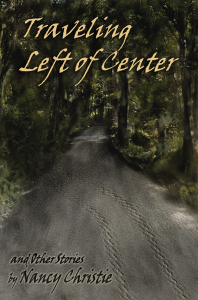
Traveling Left of Center (and Other Stories)
NC – I’ve got a couple of different projects. One is my second short story collection, called Peripheral Visions about people who are making decisions and living their lives on their own terms, regardless of what others might say. The book title comes from the title of one of the pieces, about an elderly woman finally free to follow her dream, and what happens during her journey. Here’s an excerpt:
“Shoot.” Lena caught sight of the sign pointing the way to the rest stop off I-77 almost a fraction of a moment too late. She turned the wheel sharply, the right tire of her old Ford kicking up bits of gravel from the shoulder, before navigating safely onto the asphalt turnoff.
Shaking slightly, she slowed the car to a more sedate twenty-five miles an hour before brushing the perspiration from her wrinkled forehead.
“That was close,” she said no one in particular. Talking to herself was a habit she had acquired since her mother’s passing. The young think old people talk to themselves because they are going senile. But when there is no one left to talk to, you have to talk out loud. Otherwise, the silence can be deafening. And after decades as a practical nurse where she routinely carried on conversations with patients simply to ease the sterile loneliness of the oncology ward, Lena knew the value of the spoken word—even when there wasn’t anyone around to answer.
She glanced into her rearview mirror, hoping the highway patrol car that seemed to be shadowing her hadn’t caught her latest misjudgment. That’s all she would need: flashing lights, a request that she show her driver’s license and then a trip to the police station where they would no doubt confiscate her car and contact her niece, Claire.
Claire. By now, Claire might have figured up what Lena was up to, but she still wouldn’t be sure exactly where her aunt had headed. For who would expect an elderly woman who had never driven beyond the Kingsville city limits to drive the 900-plus miles from Ohio to Florida? Not Claire, that’s for sure. Claire would have expected Lena to be looking forward to her move to Golden Glow, to being the sane, sensible, and highly predictable maiden aunt she had always been.
“Not this time, though,” Lena said aloud, as she checked the parking area for other cars, including any with the telltale light bar mounted on the roof. “For once in my life, I’m going to do I want to do, instead of walking a straight line right up to the end.”
That’s the biggest problem with the world today, she thought to herself as she gingerly slid from behind the wheel, carefully stretching her back to work out the kinks. The pain that had plagued her spine was even worse, undoubtedly aggravated by too many hours behind the wheel. She moved her body slowly, continuing her conversation aloud. “People walk around with blinders on just like horses, their eyes glued on the goal, the ‘Big Picture.’ There’s no sidestepping, no walking off the beaten path, no road less traveled. You get ahead that way, it’s true. But what if where you end up isn’t where you should have gone?”
I also have one novel I am shopping, a second one ready for the next round of revisions and a third about half-way through. (I am a multi-tasker!)
IDI – Beta readers. Do you use them as a part of your revision process and how valuable do you find their feedback?
NC – I had never even heard the term “beta reader” until my second book, Traveling Left of Center and Other Stories. My publisher, Sally of Pixel Hall Press, suggested I use them to get some feedback on the stories and they were very useful. You need to have fresh eyes looking at your work because, by the time it has gone through multiple revisions, even you don’t know what’s there! So my beta readers were a huge asset, so much so that I am looking for beta readers for my novels, even though we haven’t reached the publication stage yet.
IDI – What works for you? Give us a rundown of your ‘writing process’ from beginning to finished product.
NC – I’d love to say “I do this and then that and then here’s the work, all done and tied with a bow” but that’s not the case. Since I write for a living — magazine and corporate work— I have to shoehorn in my non-income-producing work, aka my fiction, in my schedule, usually early in the morning before I work out and start my official writing day. Life’s a little more complicated now, too, since I am care-giving for my 93-year-old father who lives with me and has some serious health issues. So I have perfected the art of “pick up and write” meaning that, if I have a spare 10 minutes, I work on whatever I can wherever I am. I also work in my head, so to speak: figure out character conflicts or come up with dialogue while I am running or shopping or mowing the grass or folding laundry. So my writing process is pretty much write all the time in one fashion or another.

Nancy Christie
IDI – Haha! There is no such thing as ‘done and tied with a bow’ in writing!
There is a lot of commotion about the effect eBooks are having on brick and mortar booksellers. Do you think eBooks have reached their climax or do you believe they still have room to expand in the market?
NC – I have read so many conflicting comments — they are a mature market, they are still in the growth phase, people want more e-books, people want print books — so I won’t hazard a guess. But I do believe that brick-and-mortar bookstores and libraries play a critical role in our communities. They provide a place for readers and writers to meet, talk, share and discuss. That being the case, it’s up to us — the writers and readers — to support them and the stores and libraries to diversify their offerings and events to attract more patrons. For example, my local Barnes & Noble is once again hosting my “Celebrate Short Fiction” Day event in December —something I really appreciate!
IDI – Do you have a blog and if so, what types of posts would a visitor find on it?
NC – A blog? How about four! (Once I started, I got carried away.) My Make A Change blog is designed to inspire people to get out of the ruts and make the changes they need to live a happier, more fulfilled life. My One on One blog is strictly interviews with authors — one author per month, with each interview posted in two parts. Focus on Fiction is all about fiction writing, with an emphasis on short fiction, and features interviews with writers and editors as well as articles on fiction writing. The Writer’s Place is a little of this and a little of that: tips on both the creative and business sides of writing, interviews and guest posts from other writers, and just whatever thoughts or drifting through my head about writing.
IDI – Four? I’m impressed (and a bit jealous). I’m lucky to keep up with one.
How much time/effort do you give to social media as a means of self-promotion?
NC – As much as I can which isn’t nearly enough. While I’m on Facebook, Google+, LinkedIn, Pinterest or on Twitter (@NChristie_OH), there are still things I don’t know how to do on social media, and I shamelessly steal from other authors when I see what they are doing.
IDI – We all know that marketing falls (mostly) on the author. Aside from social media, what forms of marketing have you engaged in? Book fairs, signings, podcasts, et cetera… Have you found them beneficial?
NC – With my current book, I am more limited when it comes to in-person events, because I can’t travel too far, given my care-giving responsibilities. (With my first one, “The Gifts of Change”, I crisscrossed the country as much as I could — easy enough since I have family members and friends in different states!) But I do as many events as I can, regularly send out media releases, and answer every request for interviews that come my way! On my website, I have a main BOOKS page plus one for each book, with sales links and reviews as well as an Events page so site visitors can see what I’m up to. Coming up, I have a couple of multi-author events (great fun for networking with other writers!), book-signings and a couple of workshops. Still to come: doing podcasts and Skype interviews!
IDI – In your opinion, what are the biggest misconceptions new authors have about the publishing industry?
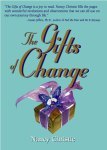
The Gifts of Change
NC – That all they have to do is write and the world will beat a path to their door to buy their book. Another misconception: their work doesn’t need edited. A third: the publisher and/or agent is supposed to handle all the marketing. A fourth: their royalty checks will push them into another tax bracket. Ah, to be so naïve…
IDI – What do you do when you’re not writing?
NC – I’m never “not writing.” In that respect, I haven’t changed much since I was a kid and played “let’s pretend.” I just wish I had the time to do all the writing I want to do.
IDI – Fun question. Your last book is racing up the best seller list. You’ve been invited to a sit down with Oprah. Describe your reaction to the news and your preparation for the show.
NC – Get my hair, nails and makeup done. Drive my friends crazy trying to figure out what to wear. Read the book again because by now I have forgotten what was in it. Wonder if Oprah made a mistake and meant to call a different Nancy Christie. Practice answers to questions she might ask and obsess over what questions she’ll ask that I didn’t think of. Remind myself that, no matter what happens — I’m a huge success or a huge flop — it will be good fodder for my fiction.
IDI – What does writing do for you?
NC – It gives me a place to hide when things are too hard to face, to practice for life events that may be coming my way and to deal with those events that took place. It pushes me forward and pulls me back.
IDI – Nancy, one last question. How do you define success?
NC – Not in monetary terms, certainly. Success is when readers tell me that something I wrote touched them or that I got it right (even if I never personally experienced it) or that it made them view their own life or options in a different way. What else could a writer hope for?
IDI – Very well said. Thank you for appearing with me today. It means a lot to me especially knowing how tight your schedule is, I admire your drive and discipline. Best of luck with all of your upcoming projects. Maybe we’ll see you back here when the next book hits the shelves!
Join Me!
Website – Facebook – Fan Page – Twitter – LinkedIn – Instagram – Goodreads – Amazon – Wattpad
Books!
Lily White Lies – The Red Strokes – Missouri in a Suitcase


September 1, 2015
A Land More Kind Than Home… by Wiley Cash
When I read the synopsis of his debut novel, A Land More Kind Than Home, it looked interesting. Then I noticed that it was a New York Times bestseller. But what made me buy it was the blurb by the Richmond Times-Dispatch. “Reads as if Cormac McCarthy decided to rewrite Harper Lee’s, To Kill A Mockingbird.” Funny what sucks a person in. Simply the name ‘Harper Lee’ or mention of her classic novel on the cover of a book seems to ensure a brilliant work of fiction.
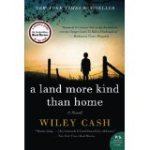
A Land More Kind Than Home
As I mentioned, A Land More Kind Than Home is Wiley Cash’s debut novel. In it, he puts a Gothic spin on a story set in rural North Carolina, an area filled with people who, in many ways, are a few decades behind much of the country. The story is told through several first person POVs bringing us ever-close to their life, story, and emotions, with secondary characters who feel just as authentic. There is a young boy, Jess, who suffers and struggles through tragedy and loss seemingly too great for his years, a strong, elderly woman who is dissatisfied with the cult-like changes within her church brought about by a new pastor, and an ex-con of a pastor who has his own way of delivering God’s word as he interprets it.
I don’t want to offer any spoilers so I won’t go too deeply into the story, but it is absorbing, well-written, and rich in imagery. I believe it’s set in 1986 (and if it’s not, I’m sure someone will correct me :) ) yet to me, the story had a much earlier feel to it. I mention this because Cash effectively presented a fairly modern story, but was able to convey the town’s unsophisticated ways without coming out and calling it backward, (showing, not telling).
Examples:
1. When Jess and Joe Bill were playing during the church service, I got a sense of Mayberry RFD. No electronic devices to amuse them, they didn’t hang out at the mall, no gangs, et cetera. Two boys being boys, playing outside, and what young boy isn’t a bit mischievous (Peeking in the church windows during a service they weren’t allowed to attend.)
2. The years-old, yellowed newspaper taped to the inside of the church windows. That detail alone told me that there was a deeper significance to that church than what one would expect or what met the eye. For me, that one detail set the stage for the dark side of worship and immediately made the church the focal point of the story.
3. The discretion used by the local law enforcement was not protocol for most areas of that time period. When a citizen beats the holy-loving out of two men who appear to pay their condolences (sort of), the deputy sheriff turned the other cheek. The lack of adherence to the letter of the law spoke of a older justice system, a good ole boys club.
I enjoyed the book on many levels, but my favorite part was the actual writing. There are two ways to write narrative and exposition. One is to drone on and on to the point where readers skim through it or skip it entirely in the search of something worthwhile to keep them turning pages. The other is to use it to bring the story to life. Details without overload. It’s in this area that a writer creates art. Knowing which details to use, which to leave out. Knowing where to place them so that they don’t feel like an info-dump and break the flow of the story or aren’t used as filler to bridge the gaps between action or scenes. Also important is knowing when to say nothing and leave it to the reader’s imagination. Cash’s prose is fresh and his metaphors and turns-of-phrase original, fitting to the scene and period.
The writing was pitch perfect. The flow was comfortable, never leaving the reader in the dust because he got ahead of himself. His characters were believable enough that I didn’t just read through their tragedies, I felt what they felt. Cash teaches us how quickly and quietly the winds of change sneak up on us and how split second decisions leave their life-altering mark.
In the end, one boy and two men are left dead, two men are left broken, and one long-broken man is given a second chance. It’s a book about life and loss, belief and doubt, hurt and forgiveness, morals and contradiction.
A Land More Kind Than Home – One of the best debut novels on the market and one I will visit again.
Join Me!
Website – Facebook – Fan Page – Twitter – LinkedIn – Instagram – Goodreads – Amazon – Wattpad
Books!
Lily White Lies – The Red Strokes – Missouri in a Suitcase

Kathy Reinhart


August 31, 2015
Paul H. Landes
IDI – Paul, it’s great to talk with you again.
Your books have a lot of technical descriptions when talking about a genetically engineered virus, computer hacking and even, in Convergent 9.0, the ancient samurai customs in Japan. Do you do a lot of research?
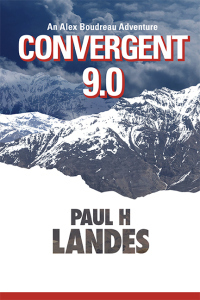
Convergent 9.0
PHL – Oh, yes, and it’s endless. My scientific aptitude is zip, nada. Fortunately, I live in a college town where the number of PhD’s rival any town in the country. Dr. Murray Gardner is a professor emeritus at our local university and has achieved international notoriety in his own right. He was part of the team that discovered the Aids virus, and this is a good story, he was the first person who brought that virus back to the States for research purposes. He put the virus in a vial and flew half way around the world with it—stuck in his pocket. Anyway, Murray worked tirelessly with me to create a virus that borders on reality and he worked with me on countless drafts helping me to write about it so even a layperson, like myself, could understand what was going on. For me, finding someone who is an expert in their field is the best place to undertake your research. I’ve thanked each of these “pros” in my acknowledgement in each book.
IDI – What is the hardest or most frustrating aspect of writing? Ideas, getting started, writer’s block, re-writing?
PHL – When I write, I’m 100% absorbed in my story and it consumes most of my time. I have a pretty busy life outside of my writing, so if I’m off doing something else I’m oftentimes unable to separate myself from whatever scene has grabbed a hold of my mind. A few months back when I was putting the final pieces together for Convergent 9.0, I had decided to move a few scenes around and make a major change in the plot. Needless to say, my mind was locked tight around the story. It just so happened that we had some friends coming to town and we were heading off to the coast for a trip we had planned for months. My wife has become accustomed to this mind-set and she knew exactly where I was at the time. “How much time do you need?” I told her just one day, a whole day. She took care of the rest and I met them all a day later, but my mind was clear.
IDI – We all draw from within and I believe there is an element of ‘us’ in everything we write. How much of you will a reader find in any given book?
PHL – Plenty. The characters are developed with my imagination, yet I draw from people I’ve known, places I’ve been or, simply, events that have fascinated me. My life has been fast paced, unpredictable, living on the edge, yet filled with love, pride and unending happiness. That’s all a part of my stories and when a reader finishes with it, they know a great deal about me.
IDI – How much time/effort do you give to social media as a means of self-promotion?
PHL – Not enough at this point. When my first book, Wings to Redemption, came out, I spent four solid months, nonstop, on every social media site I could find and I ran around doing readings at well over a dozen bookstores. I hit five states in total. The results definitely showed and I sold more books in that time than I would’ve ever dreamt. But, as you know, that can be exhausting and take away from your real life priorities. That caused me to reevaluate my goals as a writer and I now spread my marketing time out over a longer period of time. My real desire, as a writer, is to pen good books, books that entertain people, books they can enjoy and remember. To me, that’s more important than reaching a sales milestone.
IBD – That’s sound advice.
Favorite author, and why?
PHL – Hemingway, hands down. His understated and lean style influenced so many of 20th Century writers, but to me, it was the experiences he encountered in his tumultuous, but exciting life. A journalist; a war correspondent; a young author living in Paris at a time when the city was undergoing a new renaissance in art and literature; winters in Key West and summers in Wyoming. He had a tragic end to his life for sure, but it was a life he led with unbridled passion.
IDI – Who is the most supportive of you and your dream to be a writer?
PHL – My wife, by far. The original creation of my first novel, Wings to Redemption, is how I met Kristen, my wife, and how I became an author. Within weeks after we first met we asked each other the question, “What would you like to accomplish that you haven’t yet accomplished?” It turned out that we both had a secret desire to write a novel so, we began. For four months we conspired, dreamed and wrote together and throughout that process we fell in love. The book idea was eventually shelved, but we became engaged and soon married. Oh, and that was twenty-one years ago almost to this day when we started the book… a pretty happy ending. Seventeen years later, I finished the book and she continued on with her career. She continues to support everything I do as a writer. I’d be remiss to not mention my swim pals. I’m a member of a masters swimming team where I’ve had the opportunity to meet so many of the PhD’s who have stepped forward to help me out anytime I’ve asked.

Paul H. Landes
IDI – How long does it generally take you to write a book, from the spark of an idea to the finished product?
PHL – I try to get a finished product out in roughly a year and so far, I’m close to being on schedule. I’ll start off with a general idea and usually I don’t have a clue where I’m going. Things develop as I write and edit and as I talk to the experts in those particular fields. When I hit times where my creativity is on the down curve, I may pick a chapter and edit and rework it so that it’s close to the finished product. After I read my finished product it pumps me up and usually throws me back into a writing mode. I do the same thing if I just wrote a chapter that I really like – I’ll spend the extra time polishing it up. You know, in my first book I thought I had written the absolute greatest novel ever written, but I spent seven months working with my editor and when we were done it was as if I had totally rewritten the book, which, thanks to her, I had. She’s taught me so much that our final editing time now is down to around two months. At this point, I take just as much pride in editing as I do in creating the manuscript.
IDI – One last question. What are you working on now? Can we get a peek, something to look forward to?
PHL – Convergent 9.0 is the final book in the Alex Boudreau Adventure, but it’s by no means the last of Alex. In Convergent 9.0, I’ve introduced a new character who will take me into some areas that I’m chomping at the bit to explore. I’ve had long discussions with friends involved with the prison system. I’m going to take a prison gang and show how they begin to legitimize their business interests, much like the mafia had done. At the same time, they’re funneling contributions to politicians so that they can maintain the status quo. Their motto is, if you control the inside you control the outside. They want to keep it that way. There’s much more to the story like, addressing the fact that China has been illegally harvesting human organs for years and I’ll get into the ethical dilemmas faced by journalists. Of course, Alex will make more than just a cameo appearance.
IDI – Thank you, Paul. It’s been a pleasure talking with you again.
For more on Paul and his work, visit him here:
Website – Facebook – Amazon – Twitter – Goodreads – LinkedIn – Google+
Join Me!
Website – Facebook – Fan Page – Twitter – LinkedIn – Instagram – Goodreads – Amazon – Wattpad
Books!
Lily White Lies – The Red Strokes – Missouri in a Suitcase

They Appreciate The Support!


August 27, 2015
The Optimist’s Daughter… by Eudora Welty

The Optimist’s Daughter
I felt The Optimist’s Daughter was light on actual story, yet I read through it simply for the writing. Welty is a staunch believer in the writing rule of ‘less is more.’ There isn’t a frivolous word in her prose as she uses each to its fullest advantage.
One may wonder how I can appreciate her work as much as I do, yet give the work a mediocre rating. According to Amazon’s review terms, three-stars means, ‘it’s okay’. Not great, not horrible. Keeping in mind that a review is nothing more than one person’s opinion, when I give a review, I consider a few factors. The obvious: depth of characters, style, story, et cetera. The non-obvious: the way the story makes me feel and what I take away from it.
As I mentioned, Welty’s writing is tight. There is no fluff. She tells a pointed story and never wastes the reader’s time. In my opinion, there is too much fluff in contemporary fiction and I find myself skimming or outright skipping the long, needless passages that do nothing to advance or enhance the story. But, I’m simply not a fan of literature. I find the verbiage and the stilted dialogue boring. I much prefer something along the lines of Jonathan Tropper, crisp, fresh, witty. That certainly doesn’t make literary writing bad, just not my preferred taste, so I would be a hypocrite to give the book a glowing review simply because it’s a Pulitzer prize winning work of fiction. You know what they say, ‘read wide and read well.’ So I do.
Now, if contemporary writers with their wit and humor could take a page out of one of her books and cut the filler used to reach a predetermined word count, we’d have the best of both worlds.
~Join Me~
Website – Facebook – Fan Page – Twitter – LinkedIn – Instagram – Goodreads – Amazon – Wattpad
~Books~
Lily White Lies – The Red Strokes – Missouri in a Suitcase


Claudette Melanson
IDI – Let’s begin with what’s going on in your world currently. What are you working on now? Can we get a peek, an excerpt maybe to tickle our taste buds?

Shimmer
CM – Right now, I’m working on the third book in the Maura DeLuca trilogy, Riptide. This book starts out with Maura being left all alone after making some very bad choices. Please see an excerpt below:
I could see Aldiva’s cold fire dampen a bit with the arrival of this newcomer, who made her way over to me so she could lift my chin with her cool finger gauging my looks with that confident gaze of hers. “There,” she traced the fading wound with her other fingertip, “you’re almost as good as new. My, my, my but you do favor Maxwell.” She smiled at me—a reaction I wasn’t expecting—and the terror permeating my bones eased off just a touch.
She turned away from me and wagged her finger at Aldiva. “No, no, no, Aldiva. You will bring no harm to Maura.” The Romanian flair to their words still lingered in all three. It made me feel like maybe I wasn’t in Vancouver anymore, my head was so full of light and fluffy already…far too much excitement of a brand I did not enjoy. A voice that was becoming all too familiar these days whispered a reminder that I deserved any malice that came my way.
“Come, come, Maura.” I couldn’t help but shiver at the cold touch of the hands that lifted me so easily from my puddled state upon the uneven shoreline. Millicent appeared to be a friend; I hoped she wouldn’t take offense.
“I suppose Elias is right behind you?” Gregor huffed.
“Unlike you, dear Gregor, I am not so easily followed.” She chuckled darkly once more. Gregor simply rolled his eyes. Even if she hadn’t defended me against Aldiva, I found Millicent impossible not to like, immediately.
IDI – You’ve received word that you will be included in a new book of original quotes on writing to be published next year. What quote do you contribute?
CM – “The world grows weary of ‘I will,” but is incited by “I did.”
IDI – Do you have a blog and if so, what types of posts would a visitor find on it?
CM – I do indeed. My blog is a mix of things. One time you might find an interview with my very talented cover illustrator, another, a post about how I used diet to (mostly) cure my Rheumatoid Arthritis. I like to give me readers a glimpse into who I am the whole way around, so I don’t limit my topics. My last post, at this time, included a couple of Twitter tips for authors and other Twitter users. I like to help other authors out, so as I go along and learn, I’m sure there will be more posts about tips and tricks with all aspects of being an author.

Minion
IDI – I’ll have to check that out.
Everyone has visions of where they see themselves in the future, be it a year or five. Where do you see yourself in five years? Where did you see yourself five years ago? Did you make it there?
CM – In five years I hope to have at least another ten books published. That’s two a year, and I feel it’s a realistic goal. Right now, I’m trying to pick up more editing jobs, so I can work from home and gain more writing time, at the same time. My big goal is to make a living income as an author, and I’ll work toward that with everything I’ve got! I also plan to cure my RA entirely by continuing to adjust my diet. I have also set my eyes on moving back out west. I used to live in Vancouver and miss it far more than I thought I would. Ontario hasn’t been a good place for me for several reasons and I’d love more than anything to give Whitehorse in the Yukon Territories a try. I am definitely planning to move there in the next few years. Would be a stellar place to write
Five years ago, I was working on Rising Tide (it took me six years to finish it!) and hoping to get it published. I was offered a publishing contract, but didn’t like the term and lack of freedom concerning MY own work. I was the one who made it. I knew how I wanted it to come out from cover to content. I decided to go Indie all the way and am still very happy to have made that decision. I wish I could have written more books than I have now in those years, but I wrote Undertow in nine months, so I’m getting faster. Quality, however, is my priority over speed—and always will be.
IDI – What do you do when you’re not writing?
CM – I have four adorable little bunny babies. They get a lot of play time when I’m not writing. I love to get down in the floor with them and we toss around all the wooden chew toys. On a day off from writing or editing from other authors, I love to go to Canada’s Wonderland—I’m a coaster addict! We have one of the five giga coasters in the world; that’s one with a top height of 300 – 399 feet, which runs a full course. I almost chickened out the first time, but was so glad I rode it. Huge thrill! I love horror movies and reads and another favorite activity is going to the Halloween Haunt at Wonderland or Halloween Horror Nights at Universal in Florida.
IDI – Can you tell us three interesting things about you that you’re sure we don’t already know?
CM – In college, I was the biggest workaholic, both in the area of study and service. I was president of every club in the English department and in my senior year, the English department gave me an award in my name. The Claudette [Melanson] Senior Service Award. Now, that made me cry

Undertow
My English honor fraternity beat out all the social fraternities one year at the alcohol-free mix off and took the huge trophy for Best of Show. Our them was Death’s Angst—death was angry because no one was driving drunk and could be claimed by him that night. We had a graveyard with names on the stones like Danny Drovedrunk and wrote a poem that we hung up, which the school kept because it captured the idea of the event so well.
I used to waitress at a restaurant called The Italian Oven in college. We had to write our name upside down (from our vantage point) in crayon when we went up to the table. Do you have any idea how hard it is to learn how to write CLAUDETTE upside down???
IDI – Hands down, bar none, all-time favorite book.
CM – Twilight. And I know some people are so critical of that book. For some reason it spoke to me like no other. I love the way Stephenie Meyer didn’t have to rely on sex or violence to sell books. What appealed to so many people, I think, whether they realized it or not was the simplicity of that relationship. Edward didn’t want anything from Bella. He just wanted to be with her and to protect her. She didn’t need to sleep with him or have to go to extraordinary measures to please him. I thought it was a great love story and it captivated me so much, it was painful to put it down. I have no idea why so many people hated on it, especially some who loved it to begin with. But I’m proud to say I love those books…and there’s a reason they sold so many copies and spawned five movies J.
IDI – Tell us, what is an ordinary day in the life of Claudette (fill in your name)
CM – I’m always up at 6:00 AM or before. I can never sleep in. The first thing I do is cut up a banana for my four bun babies so they won’t riot and murder me. If it’s a Monday-Thursday, I’ll check some of my social media for an hour or so before going to my day job. There, I do AP/AR from 9:00 – 3:00. Once I get home I spend my evenings connecting with readers and authors on social media a touch before editing for other authors until it’s time for bed. I usually read for an hour or so at that time.
If it’s a weekend, that is when I will write along with doing the other two things. My life is all about books in every spare moment I have in one form or another, but I love it.
IDI – Do you have any events coming up we should know about?
CM – Oh, life is so busy right now! Both Rising Tide and Undertow are being made into audiobooks at the moment by Beacon Audio Books. The narrator is reading away as I type!
On September 4th, I’ll have my first radio interview with the Writestream Radio Network with S. Evan Townsend on the Speculative Fiction Cantina, which airs Friday nights at 6:00 EST. More details can be found on their website: http://writestreamradio.com/
September 17-20, I will be attending the InD’Scribe Writer’s Conference in Palm Springs, California. I will be sharing a signing table there with author, J.C. Brennan, as well as attending some of the exciting author sessions. Rising Tide is a finalist this year for a RONE Award for the category YA Paranormal. I hope to be taking home the trophy for the category overall, but will be extremely happy to display the finalist trophy, no matter what happens. More information on the conference can be found here: http://www.indscribe.com/.
IDI – You have an exciting giveaway coming up. Can you tell us more about it?
CM – I love being an author, but at one time I wanted to be an English Teacher. I studied at Indiana University of Pennsylvania and earned my Secondary English Education degree, along with a Masters in Literature.
My student teaching assignment was completed at Altoona Area High School in Altoona, PA. I was disappointed with the reading material for my classes. It was a book that wasn’t relevant to their lives or the issues they faced. I believe reading should be an adventure and should be enjoyable. I want to give back and would like to do so for the classroom, its students and its teachers, who go too often unnoticed.

Rising Tide
I’m announcing a contest open to all Middle and High school, as well as colleges in the US and Canada. I will donate signed copies of my bestselling YA Paranormal novel, Rising Tide, to a classroom and will also come to pay a visit so we can discuss books and writing.
Contest is open to teachers, students, and parents–all can feel free to enter using the Rafflecopter. There are many entry options and one winner will be drawn at random. Contest runs August 16 – February 29, 2016. Date of visit and material covered during is to be determined by the classroom teacher. Entries can be made here: http://bit.ly/1Pt4Ez2
IDI – That sounds exciting. I wish you the best with it and you’ll have to come back and let us know the outcome. Thank you for appearing with me Claudette.
CM – Thanks for having me.
Connect with Claudette!
Website – Amazon – Facebook – Twitter – LinkedIn – Goodreads – Blog
Join Me!
Website – Facebook – Fan Page – Twitter – LinkedIn – Instagram – Goodreads – Amazon – Wattpad
Books!
Lily White Lies – The Red Strokes – Missouri in a Suitcase

Support An Author, Leave A Comment.


August 25, 2015
Plan B… by Jonathan Tropper
No one writes a male coming-of-age story better than Jonathan Tropper! (This could be my review in one sentence)
But, I will elaborate.
All too often I find that many writers deliver their best stuff early on in their career. I won’t mention names as they aren’t important to this review, but I have run across a large number who were great in the beginning. I think it’s a safe bet that their initial work is what landed them their big house publishing deals. But after book number five or six, sometimes ten or so, their books seem like early-day knock offs. The characters begin to sound like characters we’ve read before, with a name change.
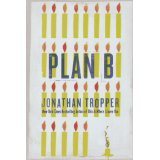
Plan B
A while back I read This Is Where I Leave You, a Tropper novel written in 2009 and probably the fifth or sixth book he’d written. (Even before I learned it was to be a movie) I loved it. Today I finished reading what I believe was his first book, Plan B. I’ll begin with his characters, as that is the only area I didn’t find fabulous. I would have found his characters wonderful had I not read This Is Where I Leave You. The characters in both books felt interchangeable and in both books, they felt like they just stepped out of Central Perk. Ben, the narrator, felt very much like Judd Foxman from TIWILY, with the rest of the cast filling in for Judd’s dysfunctional family. It’s not that they weren’t well-written, they were. I enjoyed reading them, but I would love to see the author introduce a few new characters in his next work. Someone refreshing and not the same emotionally confused, thirty-something, over analytical thinker that has shown up before.
As for dialogue, Tropper is up there with the best of them. The conversations between characters not only come off as real, but he makes you wish you were part of them. The characters come off as witty and comfortable with each other and you won’t find his turn of phrases in anyone else’s book.
There are a couple of scenes that are a bit over-the-top, just as there were in This Is Where I Leave You, but not so flamboyant as to kill the read. Actually, I believe I have now come to expect a little over-melee in his works.
My point about other writers burning out after several books is that Jonathan Tropper has not reached that point. If I compare his first book, Plan B, to his fifth or sixth, This Is Where I Leave You, my opinion is that his writing has gotten better. I would definitely pick up another of his books and hope that he continues to follow the trend he’s on now. He’s absolutely an author worth checking out.
Join Me!
Website – Facebook – Fan Page – Twitter – LinkedIn – Instagram – Goodreads – Amazon – Wattpad
Books!
Lily White Lies – The Red Strokes – Missouri in a Suitcase


D. G. Driver
D.G. Driver is the author of the Young Adult fantasy novel Cry of the Sea and YA romance novella Passing Notes, both published by Fire and Ice Young Adult Books (www.fireandiceya.com) She has been a published author for 20 years, originally writing as Donna Getzinger. She still has several nonfiction, award-winning biographies in print (with Morgan Reynolds Publishers) under that name. You can learn more about her writing at www.dgdriver.com
IDI – Think back to the first book you wrote and then the last book you wrote. In what ways have you grown?

D. G. Driver
DGD – I write much more carefully now than when I was publishing middle grade books in the early 2000s. When I wrote the non-fiction books I really learned out to research. Now I find myself researching small details I might not have back in the beginning – things I might have let slide. I’m also much more concerned with the motivations behind my characters’ actions rather than just following my plot outline. I have even changed my plots in recent books mid-stream because the storyline no longer felt genuine to the character.
IDI – What are you working on now? Can we get a peek, an excerpt maybe to tickle our taste buds?
DGD – I just finished writing a middle grade fantasy novel involving surfers and a reluctant dragon. I’m shopping that around to publishers and agents now. I’m working on some ghost stories along the same lines as my Passing Notes novella with the hope of bundling them together as an anthology. I should be getting the editing notes to my novel Whisper of the Trees any day now (the sequel to Cry of the Sea, scheduled to be published in November).
IDI – How long does it generally take you to write a book, from the spark of an idea to the finished product?
DGD – When I was younger and childless I could kick out a book in about three months. Now it takes me at least half a year, because, unless I’m under a deadline or doing NaNoWriMo, I only write on weekends. Then I like to put it aside and work on something else for a while. I come back to my story with fresh ideas and begin the rewriting process. Rewriting for me goes a lot faster, and I enjoy doing it more than first draft writing.
IDI – What works for you? Give us a rundown of your ‘writing process’ from beginning to finished product.
DGD – I come up with an idea and ramble it around in my head for a little while to see if it sticks. When it’s stubborn, I write it down as a one-page premise. I have a lot of those on my computer and in notebooks. When it keeps bugging me, I begin plotting. I plot in paragraphs – what will happen in each chapter. Then I start writing. I often research as I go, unless I’m doing a historical novel.

Cry of the Sea
IDI – There is a lot of commotion about the effect eBooks are having on brick and mortar booksellers. Do you think eBooks have reached their climax or do you believe they still have room to expand in the market?
DGD – eBooks are doing great, especially with adult women. My market is a bit harder, as my readers are primarily teens who like physical books and still get most of their books from libraries and local bookstores. However, I’ve read lots of reports that as parents are upgrading their Kindles, Nooks and iPads, they are giving the old ones to their kids. This will help find new younger readers for eBooks. Plus, eBooks are cheaper, and parents and teens both like that.
IDI – Do you have a blog and if so, what types of posts would a visitor find on it?
DGD – I do have a blog. www.dgdriver.com/write-and-rewrite-blog It primarily focuses on the revision process of writing. I do post personal trials of my writing and promotion efforts, and I feature lots of guest authors. I have month-long themes, where I will host lots of guest authors and give them a chance to promote their titles. I only focus on MG, YA, and NA books on my blog.
IDI – How important are your reading habits to your writing habits?
DGD – I read every day, although I don’t read as much as I used to. I write YA and MG, so I primarily read YA and MG, both to see my competition and to see what is trending with the teen readers. It is rare that I read from the adult section. I like to support my local Society of Children’s Book Writer and Illustrator colleagues and indie authors I’ve met in person or online, so I read a lot of lesser known books. I feel that helps build comradery between authors.
IDI – Favorite author, and why?
DGD – Stephen King is my favorite author because he has an incredible way of telling complex stories without ever slowing down the story line. He knows how to suck you right into a character’s head and see everything that character sees and feel everything that character feels. He doesn’t describe a room and then have a character run through it. He describes the room as the character runs through it.
IDI – I would agree with you there. I love Stephen King and few have his ability to effortlessly weave details into a story.
How much time/effort do you give to social media as a means of self-promotion?
DGD – I have very little time to devote to my writing career between my full-time job as a teacher and taking care of my family. Since Cry of the Sea came out in February, 2014, I have to say more of my time is spent on social media promoting than doing actual writing. Sometimes I have to go places that don’t have wi-fi to get any real work done on my manuscripts. I post a mermaid picture of some kind every day on my Instagram and Tumblr accounts along with fun book images or quotes. I post more thoughtful things about writing and what I’m up to on Facebook and Twitter. Follow me.
Facebook – Twitter – Instagram – Tumblr
IDI – What’s the best advice ever given to you, and by whom?
DGD – “I like this idea, but you need to work on it some more,” an agent about my early draft of Cry of the Sea at an SCBWI event in Nashville in 2009.
IDI – Have you ever wanted to give up? What stopped you?
DGD – I want to give up all the time. I have several moments a week when I ask myself why I’m doing this. When writing the sequel to Cry of the Sea, I kept wondering why I was writing a sequel to a book that wasn’t selling like hotcakes. What was the point? But then I get a new review, or someone on Facebook compliments my work, or my husband cooks dinner one night to give me time to do some work. Then I dive back into the words and remember that I love telling stories and have more stories still to tell.
IDI – If each of us waited to write a ‘next’ book until the previous on was selling off the shelves, most of would never have a second book.
Everyone has visions of where they see themselves in the future, be it a year or five. Where do you see yourself in five years? Where did you see yourself five years ago? Did you make it there?

Passing Notes
DGD – Five years ago I was determined to have a young adult fiction novel published with a traditional publisher. Fire and Ice Young Adult Books has now published two of my books and a third is coming out later this year. My goals 5 years from now are to have at least one title with a big publisher and to have my books in school libraries all over the country and to be doing school visits on a regular basis.
IDI – What do I consider my genre? (my own question)
DGD – I call what I’m writing these days Young Adult Contemporary Fantasy. Some call it Urban Fantasy or Magical Realism. Basically, I like to write stories set in current day situations with characters living their normal-for-them lives, and then something fantastic occurs. In Cry of the Sea, Juniper discovers real-life mermaids (not the Disney kind). In the sequel, Whisper of the Woods, Juniper discovers a spirit living in an Old Grown tree. In Passing Notes, Mark starts getting letters from a ghost.
IDI – How do you feel about message-driven, or issue-driven stories for young readers?
DGD – Cry of the Sea contains a strong theme about environmentalism. It just won 2nd place in the YA category of the Green Book Festival contest for environmental themed books. When writing a story about environmentalists and mermaids discovered during an oils spill, I had to be very careful to not make this a book about the issue of clean oceans or big oil corruption. That is not the story. The story is about Juniper and the danger, adventure, love and heartache she faces. The reader must care about her and her decisions before they can care about what happens to the ocean. I think authors of kids’ books have to be very careful how they sprinkle in the message they want the reader to take away from the book. It can’t hit too hard.
IDI – One last thing. I’ve heard you have a book trailer for Cry of the Sea. Would you care to share it with us?
DGD – Absolutely. Please go look at it and give it a thumb-up for me: Cry of the Sea
IDI – Great, I’m going to take a peek at it now. Donna, thanks so much for appearing here with me today. You have a lot going on and I wish you the very best of luck with all of it.
DGD – I enjoyed this. Thanks for having me.
Join Me!
Website – Facebook – Fan Page – Twitter – LinkedIn – Instagram – Goodreads – Amazon – Wattpad
Books!
Lily White Lies – The Red Strokes – Missouri in a Suitcase

Writing Done Well Is Magic


August 20, 2015
Omar K. Mills
IDI – First off, I want to mention how much I like the picture you included of yourself. I love the whole levitating feel.
How long does it generally take you to write a book, from the spark of an idea to the finished product?
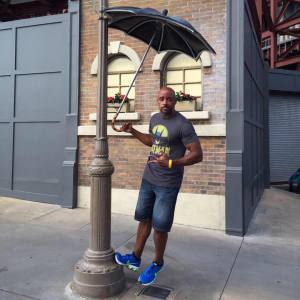
Omar K. Mills
OKM – Now? For your basic 70K word novel? About 5-months. That doesn’t include the editing process – just the draft. Edits and rewrites probably add another month or so to that.
IDI – I’m the opposite. I can get a rough draft done in about a month, but spend the next six on revisions and editing. Funny how we each have such different methods of reaching the same result.
When did you have your Eureka moment? When did know that you were born to be a writer?
OKM – Sixth grade. I wrote a play that won an award. I have pretty much always known that I was born to do this. What I wish I had known back then was writing was not a job you could apply for and then do nothing else but write. Wouldn’t it be cool if it was?
IDI – How has your writing evolved from when you began as a writer to now?
OKM – I realize now how important it is to work within the generally accepted writing structure. I was trying to reinvent the wheel before I actually understood how the rules worked. The key, I have learned, is not to discard the rules – but to see how creative you can be within them. Rules don’t confine us, they actually free us. My most recent work, the Thamro podcast (http://www.thamro.us) breaks a few rules – but I was only successful in doing so because I finally understood them.
IDI – Can we get a peek of what you’re working on now?
OKM – Sure – go to http://www.thamro.us. This is a character I have had since I was 15-years-old. I grew up during the “toy cartoon” era. So as a kid I watched a ton of He-Man, Thundercats, etc – basically 30-minutes commercials for toys. Consequently, this character is a lot like those archetypes. The challenge with Thamro was to stay true to the 15-year-old me who loves the guy, while giving 43-year-old me the chance to bring him to life in a way that makes sense today. I had always wanted to give this guy a meaningful origin story, but it was hard because I always felt like a book wouldn’t work. I wanted it to be a graphic novel, but those get very costly. Once podcasting became a medium, I knew I could bring him to life in a cost-effective way. The show uses voice actors and sound effects to immerse you into the world. It’s sort of a graphic novel for your ears. I plan to eventually take several of the episodes and convert them into novella’s.
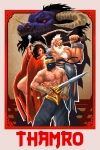
Thamro
IDI – You’ve received word that you will be included in a new book of original quotes on writing to be published next year. What quote do you contribute?
OKM – “It takes courage to be happy”
IDI – This is what some have said to be a controversial question. What are your thoughts on Amazon and the reviewing process they use? How much trust do you put into the reviews posted for any given book?
OKM – I’m not crazy about it, but if it were directly benefitting me I might feel otherwise. It’s like the midichlorians in the Star Wars prequels – the horrible explanation used to describe why people have Force powers. They took something wonderful, something any of us could potentially have, and reduced it down to a bad version of natural selection. No longer could anybody be a Jedi. They robbed us of that hope. That is essentially what the Amazon review process is, in a nutshell. Sure, you could write an amazing book, but if you’re not also great at getting random people to give you five-star reviews (something that has nothing to do with writing), then no one will ever know. On the flip-side, you could write a terrible book, but be fantastic at manipulating that system, and make a ton. All that said, in Amazon’s defense, I don’t have a better idea, so far be it from me to completely crush theirs. I just wish it were easier for us to discover great writing, or have our great writing be discovered. I don’t trust the review process because there are far too many five-star ratings. To me, five-star ratings should be reserved for life changing reads. I have several on my book – but I don’t really count too many of them. The review that has meant the most to me was given to me over the phone by my dad – who is a hard critic. When he told me that he was shocked at how good my book was – that was when I knew I had written something worth reading.
IDI – We all like to receive positive reviews. What is your reaction to a negative review? Be honest.
OKM – Negative reviews hurt, but only in the moment. I am a big believer in failing to success. My latest book, “The J. Spade Chronicles: God Mode” took me six years to get right. The early reviews from friends were soul-crushing. But here’s the thing – they weren’t wrong. I go back and look at those early versions and I cringe. A good idea was hidden in there, but it needed to be shaped. Without those harsh reviews I wouldn’t have the book that I eventually put out. They hurt, certainly, because we all want to have that sense of acceptance and approval from other people – but growth is always better. And unfortunately, growth is generally born out of pain. Think about it – if I told you that I could erase all of the pain from your life, you’d probably agree to let me do it. But if I told you that the cost of erasing that pain was that you’d forget the lessons the pain taught you, you’d probably keep the pain.
IDI – I believe yours is one of the best answers I’ve ever received to that question, and you’re right. We’d all like to live pain-free, but not at the cost of forgetting the lessons the pain taught us.
One last question, Omar. What advice would you give to new/unpublished authors?
OKM – It’s never going to be perfect. Just put it out there. Your next one will be better, I promise you, but if you don’t ever put your work out there, then you’ll never know that. I know so many talented writers that you’ve never heard of because they won’t put out anything. Drives me nuts. What good is your novel if the only person who ever enjoys it is your computers hard drive?
IDI – Once again, you’re right. Fear of something in our writing strikes all of us at some point in our career and given free-run, it can be paralyzing. Just do it! Thank you for chatting with me today, Omar. I wish you the very best of luck in your upcoming projects.
OKM – It’s been a pleasure, thanks for having me. I’d like to add that in addition to the link I provided above, readers can also check out the Facebook page for the book.
Kathy Reinhart is the award-winning author of:
Lily White Lies – The Red Strokes – Missouri in a Suitcase
Join Me!
Website – Facebook – Fan Page – Twitter – LinkedIn – Instagram – Goodreads – Amazon – Wattpad

Support An Author, Leave A Comment.





